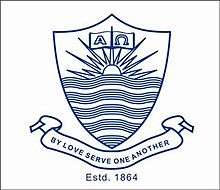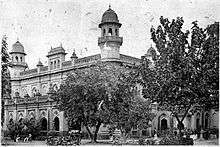Forman Christian College
Forman Christian College is an independent research liberal arts university located in Lahore, Punjab, Pakistan founded in 1864. The university is administered by the Presbyterian Church and follows an American-style curriculum.[1][2]
 | |
Former names | FC College |
|---|---|
| Motto | By love, serve one another |
| Type | Private |
| Established | 1864 |
| Rector | Dr James A Tebbe |
Academic staff | 220 |
| Students | 10,000 |
| Address | Forman Christian College Ferozepur Road Lahore 54600 Pakistan , , , |
| Campus | Residential 108 Acres |
| Colors | Blue, white, royal blue |
| Nickname | FCC FCCU |
| Website | www |
Founded in 1864 by American Presbyterian missionary Dr. Charles William Forman, the college was initially named Mission College, and changed its name in 1894 to Forman Christian College, in honor of its founder. Forman served as an associated college of the University of Calcutta until 1947 when it became affiliated with the University of Punjab. In 2004, the government granted it university charter hence providing it with degree awarding authority.[3][4]
The college was initially based in the Rang Mahal in Walled City of Lahore, which was leased by Dr. Charles from the grand wazir of Emperor Shah Jahan with the support from foreign missions.[5] In 1889 it was shifted to Napier Road and was inaugurated by the Henry Petty-Fitzmaurice, 5th Marquess of Lansdowne. Again, in 1940, the college was moved to its present campus on the banks of the Lahore Canal in 1940.[5] The college remained financially autonomous until 1960 when Pakistani government began annual grants for the college for its nursing program.[5] The college was nationalised in 1972 until 2003 when the control was returned to the Presbyterian Church.[6]
Forman is also known for its noted alumni and staff, including Nobel laureate Arthur Compton, former Indian Prime Minister I. K. Gujral, former Pakistani Presidents Farooq Leghari and Pervez Musharraf, and activist Eqbal Ahmad.[7] As of 2016, Forman is home to 6,347 students, 220 full-time faculty members with over 100 possessing PhDs, and 21,700 strong alumni.[4] Christians make up nearly 15% of the student body while the college runs a $1 million fund to finance scholarships for its students.[8][9] As of 2016, the college has been ranked 9th highest in Pakistan among medium-sized universities and is the only institute in Pakistan which is a member of the Global Liberal Arts Alliance.[10][11] The current Rector of FCC is Dr. James Tebbe.
History

The university was founded by Dr. Charles W. Forman who arrived to colonial India in 1847 and, two years later, settled in Lahore, British India (now in Pakistan). He was the founder of the Rang Mahal School, Lahore, which was the first Anglo-vernacular school in Punjab. The school added a college department in 1865 which later became a university in 2005 known as Forman Christian College University. It started offering an American style world class education in Pakistan. FCCU started new postgraduate courses along with MBA in 2007.[12]
Native to Lahore, Surendra Kumar Datta was a professor of history and biology from 1909-1914 and served as the principal of Forman Christian College from 1932-1942, later becoming the president of the All India Conference of Indian Christians and representing the Christian community of colonial India in the Round Table Conferences.[13][14]
One of Forman's faculty members, Prof. Arthur Compton, conducted the bulk of his research on cosmic rays at FCC University for which he received the Nobel Prize in 1927.
One of Professor Compton's former students Professor Piara Singh Gill taught at the college as lecturer in Physics between 1940 and 1947. Two alumni, Dr. Sir S. S. Bhatnagar and Dr. Bashir Ahmad, laid the foundation for scientific and industrial research in both parts of South Asia by establishing ICSIR and PCSIR respectively.
The first two Science graduates of FC College University were also the first Science graduates of the University of the Punjab (1900–1902). In this way FCCU was the first to establish, in this part of the sub-continent, Departments of Biology (1898), Greek, Latin and Hebrew Languages (1895–96), Industrial Chemistry (1917), Geography (1924), setting up the Experimental Psychology Laboratory, introducing the tutorial system (1908), appointing Deans of the Faculties introducing co-educational system (1902), and establishing an alumni Association (1896). Besides this FCCU also started Software engineering, CS, and IT in 2006.
Achievements
Achievements of other Formanites, as the graduates are called, include:
- Its Principal Dr. J. C. R. Ewing was knighted for his services to humanity and education. He served as Vice Chancellor of the Punjab University for seven years.
- Formanite—alumnus and teacher of the college—Muhammad Yusuf Hashmi became the first Indian Principal of Madrasa 'Aliya in Calcutta, was recognized as an educator of distinction in British India and was titled Khan Bahadur by the British Crown. Later he was recognized in Pakistan also for his contributions to education and the Pakistan Movement.
- Principal Dr. C. H. Rice and a faculty member, Dr. Khairat M. Ibne Rasa, became Vice Chancellors of the Punjab University.
- Justice Sir Mian Abdur Rashid, who was a Formanite and also the first Chief Justice of Pakistan, administered the oath of office to Quaid-e-Azam Muhammad Ali Jinnah as the first Governor General.
- The English poet and scholar Alamgir Hashmi served as lecturer in English at Forman Christian College (early 1970s) and as faculty advisor to Folio.
Accreditation
The university has designed its four-year bachelor's degree program in accordance with the standards for accreditation in the US, and is seeking accreditation through the Western Association of Schools and Colleges.[15]
Notable alumni
Politicians
- Surendra Kumar Datta, president of the All India Conference of Indian Christians who represented the Indian Christian community in the Round Table Conferences[13][14]
- Allama Mashriqi, mathematician, logician, political theorist, Islamic scholar and founder of the Khaksar movement
- Yousaf Raza Gillani, the 16th Prime Minister of Pakistan
- Shaukat Tarin, former Finance Minister of Pakistan
- Jahangir Khan Tareen, Pakistani politician and businessman.
- Inder Kumar Gujral, the 12th Prime Minister of India
- Parkash Singh Badal, chief minister of Indian Punjab several times and elected again in 2012.
- Mohammad Mian Soomro, former Chairman of the Senate of Pakistan, former caretaker Prime Minister & President of Pakistan.
- Malik Barkat Ali, former Punjabi Muslim League politician
- Shah Mehmood Qureshi, Foreign Minister of Pakistan and, the Vice Chairman of PTI
- Chaudhry Shujaat Hussain, former Prime Minister of Pakistan and current President of PML-Q
- Chaudhry Pervaiz Elahi, former Chief Minister of Punjab (Pakistan)
- Rao Sikandar Iqbal (1943–2010), former Defence Minister of Pakistan[16]
- Farooq Leghari, former President of Pakistan.
- Syed Afzal Haider, former Pakistani law minister
- Balram Jakhar (1923–2016), an Indian politician, parliamentarian, and former Governor of Madhya Pradesh.
- Malik Muhammad Rafique Rajwana, Governor of Punjab.
- Kulsoom Nawaz Sharif, Wife of Mian Nawaz Sharif
Bureaucrats and diplomats
- Roedad Khan, former Secretary General Ministry of Interior.
- Jamsheed Marker, United Nations Under-secretary General, Ambassador at Large of Pakistan (honorary doctorate)
Judiciary
- Justice (retired) Wajihuddin Ahmed, Former Candidate for Presidential Election against Pervaiz Musharraf, Former Supreme Court Judge
- Justice Sardar Muhammad Raza Khan, Former Chief Justice Peshawar High Court, Supreme Court of Pakistan Judge
- Sir Abdul Rasheed, First Chief Justice of Pakistan
- Justice (retired) Tassaduq Hussain Jillani, Former Chief Justice of Pakistan
Educationalists
- Anwar Nasim, nuclear scientist and molecular biologist
- Kauser Abdulla Malik, secretary of the National Commission on Biotechnology.
- Eqbal Ahmad, post-colonialist scholar and writer
- Ishtiaq Ahmed, PhD Stockholm University, Professor Emeritus of Political Science, Stockholm University and Honorary Senior Fellow, Institute of South Asian Studies, National University of Singapore
- Cecil Chaudhry, a decorated war hero, serving as the Principal of St. Anthony's College (Lahore)
- Mohini Maya Das, associate national secretary of the YWCA for India, Ceylon, and Burma
- Rama Tirtha, Indian teacher of the Hindu philosophy of Vedanta
- Khan Bahadur Muhammad Yusuf Syed-Al-Hashmi, educator, mentor, reformer, All India Muslim League and Pakistan Movement Leader
- Bipan Chandra, Eminent historian
- Arfa Sayeda Zehra, Pakistani educationist and Urdu language expert
Industry
- Chaudry Ahmed Saeed, CEO of Servis Industries
- Lord Paul, Swaraj Paul, founder and CEO of Caparo Group
- Sir Mohammad Pervaiz Anwer, Co-founder & Chairman, United Bank Limited.
Journalism
- Mushtaq Minhas, Provincial Minister for Information and Communication AJK Assembly, anchor of Bolta Pakistan on Geo TV
- Kuldip Nayar, Indian author and journalist
Literature and arts
- Anwar Kamal Pasha, pioneer Pakistani film director and producer.
- Krishan Chander, short story writer[17]
- Mehr Lal Soni Zia Fatehabadi, Urdu poet[17]
- Yawar Hayat Khan, senior producer/director of PTV
- Balwant Gargi, Punjabi playwright and author
- Dr. Harcharan Singh, Punjabi playwright and dramatist
Armed Forces
- Noel Israel Khokhar, General Officer Commanding 23rd Division[18] and Major General of Pakistan Army
- Pervez Musharraf, former President of Pakistan, and former Chief of Army Staff of Pakistan Army
References
- "address of FC College University". Google maps. Retrieved 13 September 2013.
- "FC College University: Best students feted ahead of convocation - The Express Tribune". The Express Tribune. 25 June 2011. Retrieved 15 June 2016.
- "History of FCC".
- "About FCC". Forman Christian College. Retrieved 13 September 2013.
- "The man who founded FC College ‹ The Friday Times". www.thefridaytimes.com. Retrieved 15 June 2016.
- "FC College: an amazing transformation - The Express Tribune". The Express Tribune. 20 September 2011. Retrieved 15 June 2016.
- "Forman Christian (F.C.) College's Political Clout : ALL THINGS PAKISTAN". Retrieved 15 June 2016.
- (U.S.A.), Presbyterian Church (27 October 2009). "Presbyterian Church (U.S.A.) - News & Announcements - The old college try". www.pcusa.org. Retrieved 15 June 2016.
- "E051819 – Forman Christian College Advance Fund, Lahore, Pakistan". Presbyterian Mission Agency. Retrieved 15 June 2016.
- "Category Wise". www.hec.gov.pk. Archived from the original on 25 May 2013. Retrieved 2016-06-15.
- "FCC Rankings".
- Ahmed, Haseeb. "About FCC". Retrieved 24 March 2013.
- "Datta, Surendra Kumar". mundus.ac.uk. Retrieved 8 May 2012.
Surendra Kumar Datta was born in 1878. He was lecturer in history and biology 1909-1914, and Principal 1932-1942 at Forman Christian College.
- Black, Brian; Hyman, Gavin; Smith, Graham M. (2014). Confronting Secularism in Europe and India: Legitimacy and Disenchantment in Contemporary Times. A&C Black. p. 88-91. ISBN 978-1-78093-607-9.
- "Archived copy". Archived from the original on 1 September 2009. Retrieved 15 September 2009.CS1 maint: archived copy as title (link). Accrediting Commission for Schools, WASC. Retrieved on 11 October 2014.
- Piracha, Aslam (30 September 2010). "Rao Sikandar Iqbal dies". Archived from the original on 3 October 2010. Retrieved 5 October 2010.
- Malik Ram (1977). Zia Fatehabadi – Shakhs Aur Shair (in Urdu). Delhi: Ilmi Majlis. pp. 116–117. Zia Fatehabadi and Chander studied together at Forman
- Dharkan Summer 2009